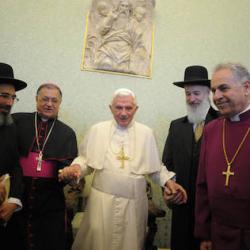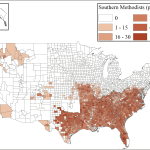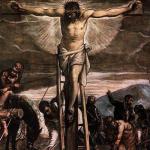My End of Protestantism (the book) deals with a number of the questions Doug Wilson raises in his brief review. Here I correct several of Doug’s misrepresentations and clarify some points, but mainly point to fuller discussions in the book.
First, on John 17: Doug says that I’m “adamant” that the the church isn’t unified, and so I must be saying the Father refused the Son’s request. For his part, Doug says “the Father must be saying ‘not yet’ instead of giving a flat no. But as soon as we do that, we find ourselves seeing the Lord’s request here as eschatological, yearning for the completion of His church. He is not praying about the mess of the construction phase, but rather what it will be like when we are setting the great ecumenical capstone.”
It would be a serious mistake, and a little dim-witted, for me to say that the Father refuses the Son. Fortunately, I didn’t. The entire premise of my book (as Fred Sanders discerned in his Christianity Today review) is that Jesus gets what He asks for, so the church will be unified. I don’t know how to make the point more clearly than I did on page 7: ”The Father loves the Son and will give him what he asks. He does not give a stone when Jesus asks for bread. . . . The Father will give the Son a unified church, and the Son will unify the church by his Spirit.” I agree entirely that unity is a gift of God, which is why I said so in the book (e.g., p. 19: “The reunion of humanity is salvation, and as such it is as much a gift as is our individual deliverance from sin”; also p. 165), and why I repeatedly emphasized the central importance of prayer for unity (e.g., p. 188).
But, second: I remain puzzled that Doug takes his claim that Jesus’ prayer is “eschatological, yearning for the completion of His church” as a discussion-ender. It’s a discussion-starter. It raises the very question my book addresses: Given that we’re heading toward unity, what should we be doing now? For Abram, the promise of land was a distant hope, beyond his life, yet he oriented his entire life around that promised future. Aren’t we sons of Abraham, imitating the faith of Abraham, the faith that is the substance of things not yet seen? (This is also an emphasis of the book, summed up in the formula I repeat, nearly ad naseum: “we are called to be now what we will be.”)
Third: Doug says that neither unity nor division is good per se. I agree. Which is why I wrote (p. 12), “The sin of the sons of God (Gen 6:1-4) was a sin of false union” and go on to describe Babel as “the great biblical story of false unification and final dispersal.” It’s why I emphasized on the following page that Jesus “came with a sword. His teaching and actions provoked opposition and forced people in Israel to choose sides. He divided fathers from sons, mothers from daughters, brothers from brothers.” It’s why I talked about the separations inherent in God’s creative action in Genesis 1 and in His government of history since (pp. 101-3).
Fourth: Doug criticizes my claim that our disunity is not the result of non-churches splitting off from churches. He lists some non-churches that have split off from churches, but that misses my point. Yes, heretical sects have split off from the church; that is not a wound in the church. Orthodox believers have separated from churches that have become synagogues of Satan; that is not a wound in the church either. But the separation of East and West in 1054 did not leave a Latin church and an Eastern non-church (or vice versa). It left behind a divided church. It left a wound within the church. Dittos with the Reformation, and with many (not all) of the separations that have occurred since. As I wrote in the book, “we cannot exonerate the church by treating division as extra-ecclesial,” and we must reject “ecclesiologies that imply that ‘the Church as such is never divided’” (p. 22, quoting Ephraim Radner).
Finally, for now: Doug disputes my claim that “once there were no denominations.” But he disputes it by un-historically conflating diversity within the church with “denominationalism.” Benedictines and Dominicans didn’t form denominations; there have been dissenting churches under European state-church systems, but that doesn’t make a state-church system equivalent to denominationalism. The church has never been entirely uniform, but denominationalism is a specific, fairly recent, historical form of the church, which I describe on pages 56-59 in a subsection helpfully titled “What Is Denominationalism?”















